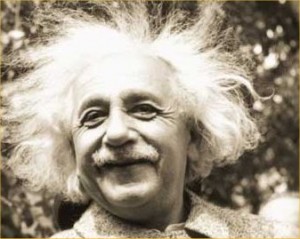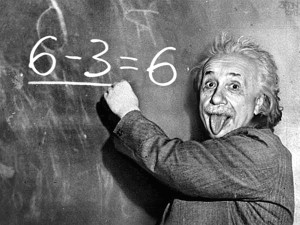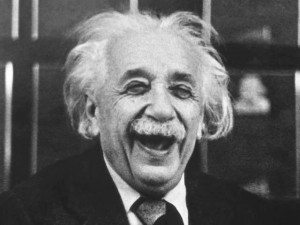Einstein was Schizotypal, but does that mean he wasn’t autistic?
 The Idiosyncratic Personality Trait is referred to as ‘The Mastermind Trait’. It does not make one an obsessive-compulsive personality, who tend to be rigid and concrete factitions in their thinking. The Idiosyncratic Trait involves being the opposite; highly fluid in one’s thinking, speculative and abstract. Without these skills Einstein would not have been able to ‘think so far outside of the box’. Temple Grandin, who is the granddaughter of an engineer and inventor and an innovator in the meat processing industry has no history indicating Schizotypal Personality Disorder. Nevertheless, she has long touted Einstein as an example of autistic ability. Recent studies have found significant overlap between Schizotypal Personality Disorder and the autism spectrum.
The Idiosyncratic Personality Trait is referred to as ‘The Mastermind Trait’. It does not make one an obsessive-compulsive personality, who tend to be rigid and concrete factitions in their thinking. The Idiosyncratic Trait involves being the opposite; highly fluid in one’s thinking, speculative and abstract. Without these skills Einstein would not have been able to ‘think so far outside of the box’. Temple Grandin, who is the granddaughter of an engineer and inventor and an innovator in the meat processing industry has no history indicating Schizotypal Personality Disorder. Nevertheless, she has long touted Einstein as an example of autistic ability. Recent studies have found significant overlap between Schizotypal Personality Disorder and the autism spectrum.
The extreme form of the Conscientious Personality Trait is Obsessive Compulsive Personality Disorder, which is almost synonymous with the archetype of ‘Aspie’. The extreme of the Sensitive Personality Trait is Avoidant Personality Disorder, again, highly common in people on the autism spectrum. The extreme of the Solitary Personality Trait is Schizoid Personality Disorder, again, something many on the spectrum identify with in greater or lesser degrees. And the extreme of the Idiosyncratic Personality Trait is Schizotypal Personality Disorder. Anyone with the predisposing personality trait can develop its exaggerated personality disorder form. If Einstein had Schizotypal Personality Disorder it was because he already had the Idiosyncratic Personality Trait, known as ‘the mastermind trait’… in too much abundance.
 Of course most people instantly assume that Schizotypal means Schizophrenic. Whilst having Schizotypal Personality Disorder is known to increase one’s risk of developing Schizophrenia (as does having Schizoid Personality Disorder) this is not the same as it being Schizophrenia.
Of course most people instantly assume that Schizotypal means Schizophrenic. Whilst having Schizotypal Personality Disorder is known to increase one’s risk of developing Schizophrenia (as does having Schizoid Personality Disorder) this is not the same as it being Schizophrenia.
Einstein has been cited in a range of studies and literature as having Schizotypal Personality Disorder. It is also a fact that his son, a promising doctor, developed Schizophrenia.
“However, he and his first wife (Mileva Maric) had a son who suffered from schizophrenia. Initially he planned to become a psychiatrist while a medical student at Zurich University. He never achieved this goal and was eventually institutionalized for most of his life, diagnosed as suffering from schizophrenia. Einstein believed that Eduard inherited the genetic predisposition toward having schizophrenia from Maric. However, this is unlikely, since she suffered from mood disorder. Einstein himself had schizotypal traits that could constitute a predisposition: he displayed echolalia beginning in childhood; he often lacked the capacity to attribute mental states to others (“theory of mindâ€) and therefore could sometimes be socially inappropriate or insensitive, especially during his youth; he was frequently disheveled in appearance; he was dreamy and distracted. The possibility that his genes might have contributed to Eduard’s illness apparently never occurred to him”. http://ajp.psychiatryonline.org/article.aspx?articleID=100418
 Schizotypal Personality Disorder is not just considered a Personality Disorder (meaning an extreme form of the associated trait) but because of its associated predisposition to psychosis is considered a Psychotic Spectrum Disorder… a PSD. But could one have both a PSD and an ASD? Like those with Multiple Complex Developmental Disorder, a form of autism involving both PSD and ASD, perhaps Einstein fitted both.
Schizotypal Personality Disorder is not just considered a Personality Disorder (meaning an extreme form of the associated trait) but because of its associated predisposition to psychosis is considered a Psychotic Spectrum Disorder… a PSD. But could one have both a PSD and an ASD? Like those with Multiple Complex Developmental Disorder, a form of autism involving both PSD and ASD, perhaps Einstein fitted both.
“Clearly, there are three ways that ASDs and PSDs could relate to each other: they could overlap, be discreet, or could be opposites as the diametric model proposes” http://www.psychologytoday.com/blog/the-imprinted-brain/201305/rethinking-autism-and-schizotypy-new-findings
What of Einstein being reported to have had echolalia as a child? Was this merely part of him being a child with Schizotypal Personality Disorder?
Echolalia is one of the most salient aspects of communication disorders in autism, but is neither unique to nor synonymous with the syndrome.[4] Echophenomena (particularly echolalia and echopraxia) were defining characteristics in the early descriptions of Tourette syndrome (TS).[1] Echolalia also occurs in aphasia, schizophrenia, dementia, catatonia, epilepsy,[1] after cerebral infarction (stroke),[5] closed head injury,[6] in blind children, children with language impairments, as well as certain normally developing children.[4]
In fact ‘deviant’ language development and Echolalia has also recently been found in Schizotypal children.
This should not be surprising as there is a 58% crossover between Schizotypal Personality Disorder and Dissociative Disorders. Akin to the student who fails to learn because he/she spent their school years daydreaming, it is a no brainer that a child who spends their early years in a dissociative state (read ‘world of their own’ as is usual in Schizotypal) as their ‘norm’ might be expected to be more predisposed to delayed language development.
If echolalia also occurs in schizophrenia and in children with Schizotypal Personality Disorder then what of Einstein lacking the capacity to attribute mental states to others?… ie Theory of Mind? Is that also part of Schizotypal Personality Disorder?
“Schizotypal personality disorder is characterized by a pattern of social and interpersonal deficits marked by acute discomfort with, and reduced capacity for, close relationships as well as by cognitive or perceptual distortions and eccentricities of behavior and present in a variety of contexts, as indicated by five (or more) of the following:
Odd thinking and speech (e.g., vague, circumstantial, metaphorical, over elaborate, or stereotyped)
Behavior or appearance that is odd, eccentric, or peculiar
Lack of close friends or confidants other than first-degree relatives
Excessive social anxiety that does not diminish with familiarity” http://psychcentral.com/disorders/schizotypal-personality-disorder-symptoms/
and studies specifically on Theory of Mind (TOM) in people with Schizotypal Personality Disorder have backed this up:
“Individuals characterized by positive schizotypy showed poorer ToM performance compared with controls. The results suggest that individuals with elevated positive schizotypy scores experience more difficulty inferring the meaning of others’ mental states (i.e., intentions) via indirect speech, such as hints”.
http://www.ncbi.nlm.nih.gov/pubmed/23588225
Einstein also DID NOT FAIL MATHS nor did he ever fail school.
“In reality, young Einstein was everything else but stupid. Although he was generally less interested in sport and foreign languages than most of his peers, he had easily mastered differential and integral calculus before he even reached 15. In addition, he never failed school and easily managed to get into the university.”
But if his echolalia, his eccentricity, his brilliance, his tendency to limited social relationships and his lack of Theory of Mind are all attributable to him having Schizotypal Personality Disorder, does this mean Einstein was not also on the autism spectrum? In other words could he simply have been a person on the autism spectrum who also had Schizotypal Personality Disorder as part of his ‘autism fruit salad‘?
Well within Multiple Complex Developmental Disorder, this is possible. This condition includes dyslexia. But unfortunately it also includes Dyscalculia, which means being innumerate, ie significantly impaired mathematical abilities.
Einstein can rest in peace. I don’t need his genius to reflect upon me. I have enough of my abilities. I don’t need him be autistic. I don’t even need his Schizotypal Personality Disorder to reflect well upon me.
As for Isaac Newton,
“Isaac Newton was a solitary, chronically suspicious, and socially aloof man
who had a variety of unusual interests and beliefs; he would probably be called schizotypal using
modern nomenclature; however, he also had a psychotic break at age 40” http://www.sciencedirect.com/science/article/pii/S0165017399000272
Emily Dickinson,
“Emily Dickinson probably suffered from schizotypal personality disorder. Not to be confused with schizophrenia, schizotypy suggests a pattern of social withdrawal, especially face-to-face interaction, and behaviors considered eccentric to cultural norms, such as unusual dress”. http://muse.jhu.edu/journals/edj/summary/v013/13.1winhusen.html
Van Gogh
“The combination of his eccentric personality, irascible temper, unstable moods and prolific creativity, makes the understanding of his illness a very complex endeavor and therefore poses a great challenge to those who investigate the relationships between the ‘artistic mind’, the brain and illness. In fact, most of the diagnoses (nearly 30) proposed for Van Gogh, during the last century, are not based on medical evidence but are ascertainable from analyses of his paintings and biographical data. Although no definitive diagnosis can be made based on such evidence, we conclude that according to DSM-IV criteria and findings extrapolated from his letters, Van Gogh is most likely to have suffered a bipolar disorder, affective or schizoaffective, which caused his death by suicide. ” http://www.karger.com/Article/Abstract/85627http://baywood.metapress.com/app/home/contribution.asp?referrer=parent&backto=issue,7,9;journal,29,63;linkingpublicationresults,1:300310,1
… the autism world has claimed them for their own too. Authors have cited them as examples of autism so nobody is about to give up that belief without a fight. Nevertheless, each are noted as Schizotypal. So either autistic pride groups can rise to the challenge of embracing Schizotypals and Psychotic Spectrum Disorders as ‘related to autism’, ascertain these lot at least had Multiple Complex Developmental Disorder involving both PSD and ASD, or guess they’ll have to reconsider their icons.
I grew up with a father who was archetypally Schizotypal and was quite like Gene Wilder in Willie Wonker and The Chocolate Factory. He also fitted bipolar, dyslexia, ADHD, language processing disorder and had significant challenges with writing and used an adding machine for his maths. I recognize my mother in both Schizotypal and Schizoid Personality Disorders, like my father she too was medicated for mood disorder and also described OCD. My older brother was semi illiterate and was diagnosed with Schizoaffective Disorder (crossover of Schizotypal Personality Disorder and Bipolar). My younger brother also has ‘fruit salad’. There are children diagnosed with autism on both sides of my family. I was part of this genetic mix with additional fetal alcohol exposure, immune disorders, a collagen disorder and a salt wasting disorder which all added to my neuro-developmental issues that were diagnosed as autism when I was two years old. I likely fit Multiple Complex Developmental Disorder, but also NIDS, PANDAS, EDS, and Gitelman syndrome.
I have no shame of my family’s ‘autism fruit salad’. And I have no problem identifying with Einstein as someone Schizotypal.
Donna Williams, BA Hons, Dip Ed.
Author, artist, singer-songwriter, screenwriter.
Autism consultant and public speaker.
http://www.donnawilliams.net
I acknowledge Aboriginal and Torres Strait Islander people as the Traditional Owners of this country throughout Australia, and their connection to land and community.

I know that I’ve also schizotypal traits, and also paranoid once. This is not suprising given the fact that my half-brother had schizophrenia. Schizotypal PD has not only overlapp with ASD, but also with Tourette-Syndrome.
Also Schizotypal Personality Disorder is just considered to be a personality disorder in the DSM, but not so in the ICD-10.
[…] Fonte […]
spot on real talk and Bravo Aussie truthism Donna What would many do without you your works all be dark ages Light On! Thanks